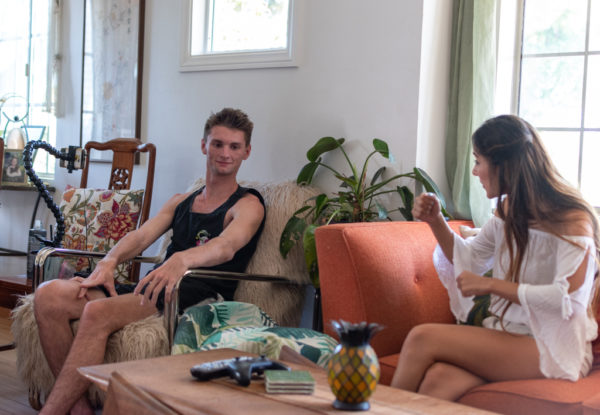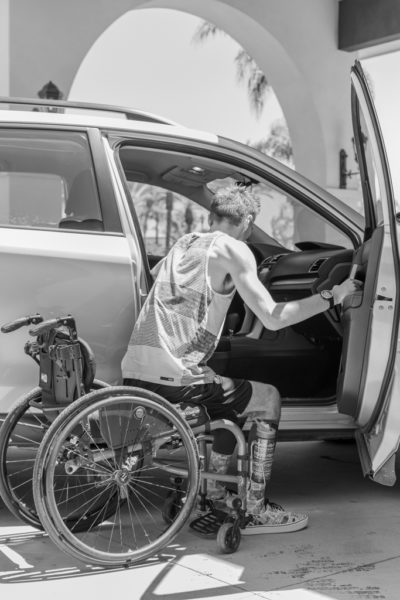Freshman motocross racer changes gears to focus on degree
Trauma victims often mark time by its relationship to a life changing event.
After a near fatal crash, doctors told an incoming Citrus freshman he would never ride motorcycles again.
On the anniversary of a paralyzing accident at Glen Helen Raceway in San Bernardino, Al Harris got back on his bike. His parents took him out to the desert. The ride was Harris’ one year recovery goal.
“It was really fun,” Harris said. “Really fun.”
In motocross racing, crashes are expected. When Harris flew over the handlebars, his mother didn’t know it was a big deal. Peggy Harris said she saw her son fall so many times, the crash didn’t shock her.
“Oh ouch, that’s gotta hurt, but he’s gonna get up right now,” Peggy Harris said. But, he didn’t get up. “He’s gonna get up, he’s gonna get up.”
When she ran to him, she said Al Harris shouted, “‘I can’t feel anything.'”
Al Harris was in surgery for six hours.
“He shattered his cervical vertebrae,” Peggy Harris said.
Cervical vertebrae are in the neck, below the skull. They consist of seven vertebrae and eight nerves, and they are all responsible for several different body functions.

“When I first got hurt I had a lot of smoothies, because I couldn’t swallow food,” Harris said.
Over half of Al Harris’ vertebrae were shattered. He was paralyzed from the nipple down.
His mother said he has a fighting spirit and follows all of the doctor’s orders.
“He knows this is his life right now,” Peggy Harris said.
Al Harris said he is excited to attend Citrus College. He is taking two classes this fall in kinesiology and health. He also goes to physical therapy five days a week. For now, he says he is majoring in kinesiology.
Harris’s plan before the accident was to continue riding before attending college. His plans changed.
Peggy Harris said her whole family had to adjust to living with Al’s disability. The restroom had to be refitted to accommodate him. Now he owns a bed that reclines so it’s easier to get out of.
His mother said Harris’ older sister, his father, and his friends in Claremont are all part of Harris’ large support system. His friends come over once a week to play video games and watch TV.
“They never make him feel left out,” Peggy Harris said. “If they’re going out, they come pick him up.”
To practice riding again, Harris started on a bicycle. He got on a bicycle again on April 23 — his 18th birthday.
He said he was excited and rode up and down in his neighborhood a couple of times.
The day marked 15 years since he began riding a motorcycle at age 3.
He said his next goal is to use his walker less and drive a car again. Harris has his learner’s permit and was about to get his license before the accident happened.
Before his accident, when he was done racing, he wanted to train other riders.
The Glen Helen accident happened during Harris’ first professional race for prize money.
Entry into a professional race requires a skill level assessed by gaining professional skills points. Points are awarded for a rider’s judgment in a race. Professionals make it on TV when they accumulate enough “pro points.”

Harris waited over a decade for his TV debut, but his goals changed after the crash. Next he wanted to walk in graduation.
The former racer said going back to high school his senior year, after the accident was a strange experience.
“It was different and took adjusting,” Harris said.
Walking on stage for his diploma was his next goal. Harris missed every high school dance except prom because he was in the hospital.
After his daily therapy, Harris’ teachers would visit him at his home close to Claremont High School.
He’d get dropped off every morning and picked up by his sister, Shannon, or father, Ken, who would take him to therapy. He left school during lunch because therapy was at 1pm.
Harris raised himself from his wheelchair to a walker and up a ramp to receive his diploma on June 14.
Citrus was the first place his family said he should attend after graduation. Peggy Harris graduated from Citrus too.
Even though he says therapy is difficult, Harris said he hopes to continue while earning his degree.
“Some of the workouts are really hard,” Harris said. “Walking without a walker is hard to balance.”
But Harris said he could not move anything after the accident
“It could be worse,” Harris said.
He also receives swimming therapy once a week. Some things are harder in the water. When he is in the 7-foot deep end, Harris swims with two pool noodles so he does not sink.
“Never give up,” Harris said with a smile. “It could always be worse. Be happy.”


